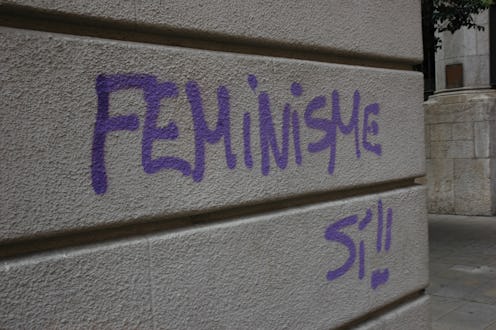Life
8 Ways You're Not Being Inclusive Enough

Considering that feminism is about openness and equality for all genders, you'd think that it would be easy to be inclusive; just keep your own privilege in mind and you're good to go, right? Unfortunately, ways you're not being an inclusive enough feminist can sneak up on you without you realizing it. In the real world, no one ever wakes up in the morning and decides they're in the mood for some old-fashioned oppression of women of color, or that they want to take away trans women's rights just because they can. The truth is perhaps worse: Sometimes, privileged women (and men) exclude and oppress their fellow feminists without even realizing it, simply because they aren't aware how deeply their privilege extends.
Of course, there's no "right" way to be a feminist; as long as you're advocating for equality for all genders, you've earned your right to call yourself part of the movement. However, like many civil rights movements, feminism has historically benefited those society deems more "acceptable," i.e., white and upper-class; as a result, women from other backgrounds have repeatedly been left in the dust of so-called progress and told to be happy with their lot. Fortunately, that's where inclusive feminism comes in: With the increasing mainstream focus on intersectional identities, women of different ethnicities, sexualities, abilities, and economic backgrounds are finally being given the chance to make their voices heard — that is, as long as other feminists give them the space to speak.
This isn't to say that more privileged feminists should silence themselves; after all, feminism is about allowing everyone to speak out. Rather, it's important to recognize how privilege gives you more opportunities than other women, often in ways that are so ingrained you may not recognize them. If you find yourself participating in any of the following not-so-inclusive behaviors, don't beat yourself up about it! Just recognize what's going on, and try to be more inclusive next time.
1. You Think Every Woman Experiences The Patriarchy The Same Way
There are some experiences that virtually all women share, including street harassment, patriarchal beauty standards, and slut-shaming, to name a few. That being said, everyone has different identities that affect their treatment in society. For instance, a black, bisexual woman is going to have a very different experience than a Latina, trans woman, and both of them are going to have a different experience than a straight, white single mother. Our interlocking identities shape our experiences in the patriarchy, and assuming that your experience is the "right" one doesn't help anyone.
Fortunately, this is pretty easy to fix: Don't shoot other people's experiences down just because you haven't seen them in action.
2. You Don't Respect Sex Workers' Decisions
Even if you think they ultimately participate in their own objectification, ascribing sex workers' career choices to the patriarchy totally negates their agency in their own life choices. The solution? You don't have to be a sex-positive feminist to give sex workers simple respect.
3. You Shame Women For Not Being Sex-Positive Enough
On the flip side, shaming women for not having enough sex is hardly inclusive either. Prude-shaming, as some call it, is just as judgmental as slut-shaming, just for the opposite reason. Some women like to have lots of sex, while others aren't really into it; neither preference says anything about whether she's a "good" feminist. When are we going to stop policing everyone's sex lives?
4. You Don't Think Men Can Really Be Feminists
Simone de Beauvoir argued in The Second Sex that men can't be feminists because they benefit from the patriarchy. However, as much as they stand to gain from male-centered society, men are hurt by the patriarchy too, and they stand as much to gain from feminism as women do. Just because men come from a place of privilege doesn't mean they can't understand that women are oppressed. Although it's natural to be a little suspicious of men who want to ally themselves with the oppressed, don't reject someone outright because of their gender.
5. You Don't Consider Trans Women "Real" Women
Astonishingly, some feminists don't consider trans women "real" women, largely due to thinly-veiled transphobia. Whether you're born with a vagina or not, if you identify as a woman, you're a woman. End of story.
6. You Think Rape And Domestic Violence Are "Women's Issues"
Is the majority of sexual assault perpetrated by men on women? Yes. However, recent statistics have shown that up to 38 percent of rape victims are actually men, along with one in 10 victims of domestic violence. In fact, researchers say the number could actually be higher, but men are known to vastly underreport incidents like sexual assault, in part because of harmful assumptions that these are "women's issues."
While you don't have to go out and start a male domestic violence shelter if you don't want to, it's important not to dismiss men's experiences with sexual assault and domestic violence. It also never hurts to use gender-neutral language when you can.
7. You Feel Sorry For Women In Non-Western Countries
Do you feel "bad" for women who live in the Middle East or Africa because "feminism hasn't reached these areas yet?" Don't. Not only is it condescending, but it totally ignores these women's ability to stand up for themselves — a capability that they demonstrate loudly and often around the globe. Rather than spending time judging other cultures, try supporting these women's efforts to change society.
8. You Think White Feminism Doesn't Exist
Women of color are consistently told that race and feminism are separate issues, even though they're clearly intertwined. Many still believe that "white feminism," which ignores the effect ethnicity has on women's lives, doesn't exist. Ironically, this is the perfect demonstration that white feminism is alive and well, and it'll stay that way until we learn to accept other points of view.